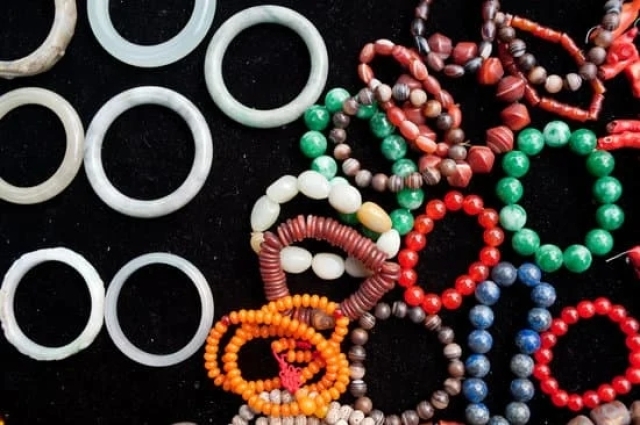Having all natural homemade jewelry cleaner can be very beneficial for anyone looking to keep their precious pieces of jewelry clean. Natural cleaners are generally safer and healthier for both the person cleaning the jewelry and the environment than commercial products filled with harsh chemicals. Homemade jewelry cleaners allow for a more customized approach to cleaning based on what type of jewelry is being cleaned to ensure the best results without risking damage or discoloration.
Using natural ingredients in a homemade jewelry cleaner provide numerous benefits for users. Natural ingredients are typically gentler on gemstones and metals, reducing the risk of removing delicate finishes or causing scratching or discoloration from harsh chemical cleansers.
Natural ingredients may also reduce odors associated with bacteria or other environmental contaminants commonly found on most jewelries without masking scents that may remain after cleaning with overpowering perfumes found in many over-the-counter store purchased products. Natural ingredients may be less likely to cause skin reactions, such as irritation or burning, due to limited chemicals used in their production and these natural ingredients can often be much cheaper than store bought products as well.
Precautions & Cleaning Tips While natural homemade jewelry cleaners can be beneficial for users looking for healthy, safe alternatives, it is important that steps are taken when using any type of cleaner. When creating a homemade cleaning recipe, it is important that only gentle detergent and sudless solutions are used that will not damage or discolor delicate finishes on stones and metals.
Additionally, storing jewelries where dust accumulation could occur should always be minimized as this can add extra clutter when creating a solution which also lessens its efficacy.
Furthermore, carefulness when handling jewelries by wearing gloves helps prevent any oils or dirt from transferring onto the stones; ultimately neglecting progress made while utilizing a natural home amateur’s homemade jewelry cleaner. Following these steps can help ensure effective results when utilizing all natural homemade jewelry cleaner solutions safely and effectively with little chance of causing additional harm to your precious pieces.
Materials Needed for Natural Homemade Jewelry Cleaner
- 1/4 cup of baking soda
- Two tablespoons of sea salt
- A tablespoon of dish liquid soap
- One liter of warm water
This all natural homemade jewelry cleaner is a great alternative to commercially sold jewelry cleaners, with no harsh chemicals or artificial scents. To make this cleaner you will need to gather the following ingredients: 1/4 cup of baking soda, two tablespoons of seas salt, one tablespoon dish liquid soap and one liter warm water.
First, take one-fourth cup of baking soda and pour it into a bowl that is large enough to hold at least a liter of water. Add the two tablespoons of sea salt and stir everything together until the ingredients are blended well. Then add a tablespoon of dish liquid soap and mix it all together until it resembles a paste-like consistency.
Next, fill your bowl with one liter of warm water and stir again until all the liquids and solids are combined thoroughly. You can tweak this recipe by adding more or fewer ingredients depending on how much jewelry cleaner you would like to make in one go.
For instance, if you want more cleaner for larger batches you could add up to half a cup of baking powder instead, as well as increasing the amount of other ingredients accordingly. This will increase both volume and potency for larger batches.
Once your mixture is ready, immerse the jewelry in it for fifteen minutes so that all dirt particles are broken down. After fifteen minutes, use an old tooth brush or any soft bristled brush to scrub away any residue that has gathered on the jewelry piece during its soak in the mixture. Once scrubbing is complete rinse with lukewarm water and dry gently with a clean cloth before placing back in storage or wearing them out again.
Preparing Yourworkspace for an Effective Cleaning Experience
When it comes to making your own jewelry cleaner, there are a few tips that can make the job easier and help ensure the best results. Before you begin, preparing the workspace you’ll be working in is key.
- Gather all necessary materials: jewelry cleaner solution (like baking soda and warm water), cotton swabs, an old kitchen toothbrush or soft brush, a soft cloths/dish towel.
- Clear a spot that is clean, well-lit and clutter free.
- Cover the surface with a protective mat, such as newspaper, placemat or paper towels.
Once you have gathered all of the materials and prepped your workspace for an effective cleaning experience, you can begin by filling up your bowl with warm water and creating a bubbly mixture with baking soda. If needed for tougher stains or dirtier pieces of jewelry, add 1 tablespoon of white vinegar to the solution. Doing so will create an even more powerful cleaning agent perfect for tackling next-level grime.
Place your gems in either an open container or strainer. Submerge them into the solution completely before scrubbing gently with your toothbrush. Gently move the brush in circular motions around crevices and small cracks that may contain dirt until your stones look shiny and bright again. Be sure to be extra gentle when brushing gold as it is much softer than other metals like silver.
Finally remove any remaining residue from your pieces of jewelry with a damp soft cloth or paper towel before placing them onto your drying rack if applicable. With this easy homemade jewelry cleaner recipe you’ll have shiny gems ready for their next outfit.
Step-By-Step Guide on Making Natural Homemade Jewelry Cleaner Safely
Preparing the Solution
The first step in preparing homemade jewelry cleaner is to create a mild soapy solution using distilled water, Dawn dish soap, and baking soda. To start, one should fill a bowl with about 2 cups of distilled water. Then add 1 teaspoon of Dawn dish soap, and ½ teaspoon of baking soda to the water. Finally, mix the solution together until all ingredients are fully incorporated.
Cleaning Jewelry with DIY Cleaner
Once the cleaning solution is prepared, it should be used immediately for best results. To ensure safety when cleaning jewelry, items should not be soaked overnight; this is especially important with silver items because over soaking may cause them to tarnish quicker. First, dip a soft cloth or sponge into the mixture and soak it in the solution for approximately 15 seconds before using it on the jewelry pieces.
Finally Dampen the cloth or sponge and use it to wipe down all areas of your chosen jewelry item. Take care when wiping around delicate areas such as stones or special settings and be sure to rinse thoroughly once finished.
Finishing Touches
Once finished dipping all items in the solution, it is important to properly clean and dry them before putting them away for storage again. This will help remove any soap residue that may remain on each piece after being put through your natural homemade cleaning process.
Use a damp cloth that has been soaked in cold water to wipe away any dirt or grime left over from the cleaning process; then dry each item carefully with a lint-free soft cloth before storing them again safely inside their respective holding catches or boxes.
Key Techniques for Using Natural Homemade Jewelry Cleaner
Using natural homemade jewelry cleaner is an economical and safe alternative to store-bought cleaners. It is better for the environment, and cheaper too. Natural, homemade jewelry cleaners are made from a few simple ingredients, such as white vinegar, baking soda, or lemon juice. These three household items can be combined to make an effective cleaning solution that will not harm precious gems or metals.
The most basic formula for a natural jewelry cleaner involves white vinegar and baking soda. This combination creates a gentle cleaning solution that is powerful enough to remove all dirt and grime but gentle enough to protect delicate settings. Start by filling your container with ½ cup of warm water and adding 1 tablespoon of baking soda and 1 tablespoon of vinegar.
Stir until the mixture turns into a thick paste, then dip in the jewelry for a few seconds before brushing with a soft toothbrush or soft cloth. Once finished cleaning, rinse the jewelry item in cold water to remove any residue from the cleaner before letting it air dry.
When using lemon juice as a natural jewelry cleaner, start by mixing 2 tablespoons of lemon juice with 1 teaspoon of salt in your container. For more delicate pieces like pearls, use equal parts lemon juice and distilled water instead of saltwater for gentler cleaning effects.
To use this method you will need an old toothbrush or soft cloth since both acidity levels are strong enough to dissolve metals like silver if left on for too long. Dip the jewelry in the lemon mix solution then brush gently until dirt has been removed from each corner and crevice; finally rinse under clean running water before allowing it to air dry on its own time without any direct contact with sunlight or heat sources.
Overall, natural homemade jewelry cleaners are incredibly versatile alternatives when it comes to keeping our valuable items sparkling clean without overspending or putting them at risk of being damaged due their exposure with chemical products available in stores – making them an ideal choice for those who care about maintaining jewels safely and economically.
Common Mistakes When Cleaning Jewelry and How to Avoid Them
Cleaning jewelry can be a tricky task due to the delicate nature of the materials. To clean your jewelry, you need to use the right products and techniques, or else you run the risk of damaging it. Here are some of the most common mistakes people make while cleaning their jewelry, and how to avoid them:
- Using abrasive products – Abrasive products like steel wool or baking soda may seem like an easy fix for your items, but they are not gentle enough for jewelry. They can scratch off the rhodium plating on silver rings or leave behind tiny bits that can cause further damage. Instead, find more gentle solutions.
- Making assumptions about what’s safe – Many people assume that all water is okay for cleaning jewelry, but this isn’t necessarily true. Regular tap water contains chemicals that can damage precious metal and gems over time. Use distilled water if possible.
- Missing areas – Small crevices around gemstones and settings can easily get missed when cleaning jewelry by hand. This makes it hard to remove dirt or build-up from these areas, so using a soft toothbrush to scrub in those places is useful
Cleaning your jewelry doesn’t have to be difficult if you know how to do it correctly. If you use too much product or pressure during the process, you risk causing damage that will lower its value in both an emotional and financial sense. Follow these tips and use a natural homemade cleaner such as dish soap diluted with warm water to gently clean your item without any damage.
Advantages of Making Your Own Jewelry Cleaner
Creating your own homemade jewelry cleaner has many advantages compared to store-bought cleaners. For one thing, most store-bought cleaners contain chemicals that are harsh and potentially dangerous if handled improperly.
Homemade cleaners are usually made from ingredients found around the house which are far more natural and safer than commercial products. Additionally, homemade cleaners are often just as effective as their store-bought counterparts but cost considerably less money since they use inexpensive everyday ingredients like white vinegar or lemon juice which has natural oxidation powers same as traditional methods used in professional jewelers’ shops.
Another advantage of making your own cleaner is that it’s much easier on the environment since there are no harsh chemical ingredients added into it. This means that when disposing of the wastewater after but before spoiling, no harmful effects will be left behind on nature elements such our small living creatures etc.
Furthermore, making a handmade cleaner also gives you the opportunity to customize it according to what type of metal and gemstone jewels exactly need, rather than having just 1 universal commercial solution. Lastly, experimenting with simple household ingredients makes jewerly cleaning a fun DIY project for everyone.
Pro Tips for Long-Term Jewelry Care
Jewelry is a great way to express your style and make a fashion statement. However, the wrong jewelry care routine can significantly damage your delicate pieces. To ensure that your jewelry keeps its original luster and beauty, it is crucial to use natural and safe methods when cleaning them.
One of the most effective all-natural homemade jewelry cleaners that you can use is a mixture of liquid soap and warm water. Start by mixing 1 part liquid soap with 4 parts warm water in a small bowl or container. Stir the solution until it’s bubbly and foamy before soaking the jewelry pieces in it for 5 minutes.
Gently scrub each piece using a soft brush to remove any dirt or gunk build-up on them. Finally, rinse off the jewelry with clear water and dry them off with a soft cloth. Not only does this method effectively clean all kinds of metal and gemstone jewelry but it also does not leave any harsh chemicals behind on the pieces, ensuring their long life.
Proper storage is another very important factor when taking care of your jewelry. Pieces should be individually stored preferably in cotton fabric-lined compartments or boxes to prevent them from scratching against each other or getting tangled up in other pieces which can make them difficult to access easily.
Additionally, they should be kept away from heat, moisture, bleach solutions as well as abrasive materials like plastic zip lock bags which may cause discoloration or gradual deterioration over time due to reaction with other chemicals present in these items. Ensuring an adequate air circulation wherever you store your jewelry also helps retain their original condition for longer durations.
Finally, you should never wear any form of metal-made jewellery while swimming-especially in sea water-or performing strenuous activities like playing contact sports as these expose them to saltwater/chlorine which corrodes metal more quickly than normal conditions would allow for. Similarly, removing gems from any setting before washing will help protect them from accidental drops during cleaning process too.
So following these simple tips along with regular cleaning will help keep your favorite jewellery looking beautiful and radiant throughout many years to come.
Final Thoughts
Making your own natural jewelry cleaner at home has many benefits. Not only is it inexpensive to make, but you also know exactly what ingredients are going into the cleaner. You have control over how much foaming and cleaning action you desire and can customize your cleaner according to specific jewelry needs. Natural homemade cleaners provide excellent cleaning results without the harsh or abrasive chemicals found in commercial jewelry cleaners.
The natural homemade jewelry cleaner is easy to make using common household ingredients: baking soda, table salt, and warm water. It creates a paste-like solution that when applied to jewelry helps dissolve dirt, oils, and residue that builds up with regular wear.
By simply brushing the paste gently onto the jewels and rinsing with warm water this method will bring back jewelry’s sparkle and shine quickly. The result of the natural cleaning method leaves no harmful chemicals behind on your jewels – only sparkling clean pieces.
The real advantage of opting for a natural homemade cleaner is its versatility; being able to adjust the strength of solution as needed, ensuring it can be used safely on all kinds of metal surfaces including silver, brass, copper and even gold plated stones. You can also dilute it or tailor the solution by adding special ingredients like lemon juice or vinegar for extra power against tough grime or oxides built-up on any type of metal surface.
Other substances like dish soap can be added for heavy-duty operations or if you’re looking for an extra polish finish. All of these solutions are gentle enough for everyday use without causing any kind of damage to delicate surfaces such as gemstones and semi-precious metals used in fine jewelry pieces such as necklaces, rings and earrings.
When choosing between commercial chemical based products which may contain harsh solvents or acid components versus the all-natural home remedy described here – the clear choice should be a winner every time – especially if you are concerned about protecting your precious gems from harm from harsh chemicals while still getting impressive cleaning results.
Knowing everything that makes up this mixture whether prepping for harder set in material or environmentally friendly conscience is undoubtedly high assurance that you’re caring for both your beloved jewels while preserving their brilliance well into future generations’ bonding moments – if maintained properly with just the right balance between natural ingredient components beating out those ever present resistant oxides.

Welcome to my jewelry blog! My name is Sarah and I am the owner of this blog.
I love making jewelry and sharing my creations with others.
So whether you’re someone who loves wearing jewelry yourself or simply enjoys learning about it, be sure to check out my blog for insightful posts on everything related to this exciting topic!





